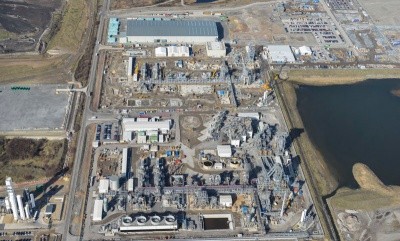Air Products shuts down Tees Valley development
 American gas producer Air Products has announced that it is leaving the energy-from-waste (EfW) business, ceasing the development of two large incinerator developments in the North East.
American gas producer Air Products has announced that it is leaving the energy-from-waste (EfW) business, ceasing the development of two large incinerator developments in the North East.
In a statement issued yesterday (4 April), the company said that testing and analysis at the Tees Valley Project, which consists of two gasification projects – Tees Valley 1 and 2 – had indicated that ‘additional design and operational challenges would require significant time and cost to rectify’.
The company said: ‘Consequently, the board of directors has decided that it is no longer in the best interest of the company and its shareholders to continue the Tees Valley projects.’
The two identical plants were under development near Billingham, Stockton-on-Tees as part of a contract with Impetus Waste Management, and were due to process municipal residual waste collected by Hull City Council, as well as commercial and industrial waste collected by Impetus.
Together, the two plants were expected to process 700,000 tonnes of feedstock every year, using plasma gasification technology to convert refuse-derived fuel into gas for the national grid. Air Products had said that the plants would generate enough energy for around 100,000 homes.
Tees Valley 1 (TV1) cost an estimated $500 million (£320 million) to construct and was originally due to begin operations in 2014, but because of delays caused by technical issues has not yet passed the final stages of commissioning.
Construction of Tees Valley 2 (TV2) had begun, but Air Products temporarily stopped construction work on the incinerator development in November, which reportedly resulted in 700 construction workers being laid off. At the time, it reassured staff that work on TV1 would continue.
Commissioning of TV1 and construction on TV2 will now be stopped permanently. Air Products has said that it is seeking buyers for the part-built development to ‘optimise the cash value of its investments’. The firm expects the decision to discontinue the development to result in a write-off of between $900 million and $1 billion (£630-£700 million).
No immediate job losses
Seifi Ghasemi, Chairman, President and CEO of Air Products, said: "Air Products is focused on our core industrial gas business. We pushed very hard to make this new EfW technology work, and I would like to thank the team who worked so diligently. We appreciate the hard work of our employees and contractors at the site, and certainly understand their disappointment in this decision. We are also disappointed with the outcome."
Michael Blench, GMB Regional Officer, said: "This is another crushing blow for employment on Teesside. Both Tees Valley EfW projects, TV1 and TV2, have provided employment for the region but the inability of Air Products to purchase the right, proven technology and then its reported incompetence at rectifying the design flaws has now resulted in both plants being potentially scrapped.
"The knock-on effect is going to deny work for the local supply chain and jobs for local people in both running the plants and maintaining them. You couldn't invent a story like this if you tried"
The development has direct employees and up to 20 contracted firms working on the site, but, responding to the news, Stockton South MP James Wharton said: "I spoke with Air Products today and there are no immediate job losses, but this is clearly very worrying for staff.
"I will offer support where I can, but ultimately this is a commercial decision by Air Products; they have said they no longer want to operate the plant, and they want to get the best value out of the asset – whether that means it will be axed, we don’t know."
Stockton North Labour MP Alex Cunningham told the BBC: "This is yet more devastating news for Teesside coming on the tail of thousands of other lost jobs in the area in steel, construction, metal and related industries in recent months.
"People on Teesside need to know whether the incomplete plants have a future, if they will be sold or there is some other options for them. I will also be raising the issue in Parliament when it returns next week."
Move shows faults of gasification
Critics of incineration developments have been quick to point to the Air Products statement as proof that processes like gasification and pyrolysis are inadequate treatment options for the nation’s residual waste.
Shlomo Dowen, National Coordinator of the United Kingdom Without Incineration Network (UKWIN), said: "Gasification and pyrolysis are synonymous with technology failures, bankruptcies and broken promises. As such, UKWIN is unsurprised that Air Products failed to get an unworkable technology to work.
"We hope this latest admission of defeat acts as a wake-up call for the government who have been unwisely stoking this whole misadventure with environmental harmful subsidies and other unwarranted financial support. Investment should focus on sorting technologies and other infrastructure that will move us towards a circular economy, not wasted on disposal technologies which, even if they worked, would still be destroying valuable materials whilst exacerbating incineration overcapacity."




